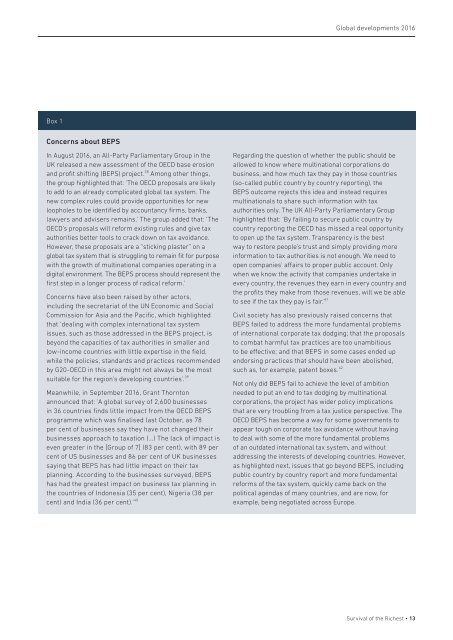Create successful ePaper yourself
Turn your PDF publications into a flip-book with our unique Google optimized e-Paper software.
Global developments 2016<br />
Box 1<br />
Concerns about BEPS<br />
In August 2016, an All-Party Parliamentary Group in <strong>the</strong><br />
UK released a new assessment <strong>of</strong> <strong>the</strong> OECD base erosion<br />
and pr<strong>of</strong>it shifting (BEPS) project. 38 Among o<strong>the</strong>r things,<br />
<strong>the</strong> group highlighted that: ‘The OECD proposals are likely<br />
to add to an already complicated global tax system. The<br />
new complex rules could provide opportunities for new<br />
loopholes to be identified by accountancy firms, banks,<br />
lawyers and advisers remains.’ The group added that: ‘The<br />
OECD’s proposals will reform existing rules and give tax<br />
authorities better tools to crack down on tax avoidance.<br />
However, <strong>the</strong>se proposals are a “sticking plaster” on a<br />
global tax system that is struggling to remain fit for purpose<br />
with <strong>the</strong> growth <strong>of</strong> multinational companies operating in a<br />
digital environment. The BEPS process should represent <strong>the</strong><br />
first step in a longer process <strong>of</strong> radical reform.’<br />
Concerns have also been raised by o<strong>the</strong>r actors,<br />
including <strong>the</strong> secretariat <strong>of</strong> <strong>the</strong> UN Economic and Social<br />
Commission for Asia and <strong>the</strong> Pacific, which highlighted<br />
that ‘dealing with complex international tax system<br />
issues, such as those addressed in <strong>the</strong> BEPS project, is<br />
beyond <strong>the</strong> capacities <strong>of</strong> tax authorities in smaller and<br />
low-income countries with little expertise in <strong>the</strong> field,<br />
while <strong>the</strong> policies, standards and practices recommended<br />
by G20-OECD in this area might not always be <strong>the</strong> most<br />
suitable for <strong>the</strong> region’s developing countries’. 39<br />
Meanwhile, in September 2016, Grant Thornton<br />
announced that: ‘A global survey <strong>of</strong> 2,600 businesses<br />
in 36 countries finds little impact from <strong>the</strong> OECD BEPS<br />
programme which was finalised last October, as 78<br />
per cent <strong>of</strong> businesses say <strong>the</strong>y have not changed <strong>the</strong>ir<br />
businesses approach to taxation (...) The lack <strong>of</strong> impact is<br />
even greater in <strong>the</strong> [Group <strong>of</strong> 7] (83 per cent), with 89 per<br />
cent <strong>of</strong> US businesses and 86 per cent <strong>of</strong> UK businesses<br />
saying that BEPS has had little impact on <strong>the</strong>ir tax<br />
planning. According to <strong>the</strong> businesses surveyed, BEPS<br />
has had <strong>the</strong> greatest impact on business tax planning in<br />
<strong>the</strong> countries <strong>of</strong> Indonesia (35 per cent), Nigeria (38 per<br />
cent) and India (36 per cent).’ 40<br />
Regarding <strong>the</strong> question <strong>of</strong> whe<strong>the</strong>r <strong>the</strong> public should be<br />
allowed to know where multinational corporations do<br />
business, and how much tax <strong>the</strong>y pay in those countries<br />
(so-called public country by country reporting), <strong>the</strong><br />
BEPS outcome rejects this idea and instead requires<br />
multinationals to share such information with tax<br />
authorities only. The UK All-Party Parliamentary Group<br />
highlighted that: ‘By failing to secure public country by<br />
country reporting <strong>the</strong> OECD has missed a real opportunity<br />
to open up <strong>the</strong> tax system. Transparency is <strong>the</strong> best<br />
way to restore people’s trust and simply providing more<br />
information to tax authorities is not enough. We need to<br />
open companies’ affairs to proper public account. Only<br />
when we know <strong>the</strong> activity that companies undertake in<br />
every country, <strong>the</strong> revenues <strong>the</strong>y earn in every country and<br />
<strong>the</strong> pr<strong>of</strong>its <strong>the</strong>y make from those revenues, will we be able<br />
to see if <strong>the</strong> tax <strong>the</strong>y pay is fair.’ 41<br />
Civil society has also previously raised concerns that<br />
BEPS failed to address <strong>the</strong> more fundamental problems<br />
<strong>of</strong> international corporate tax dodging; that <strong>the</strong> proposals<br />
to combat harmful tax practices are too unambitious<br />
to be effective; and that BEPS in some cases ended up<br />
endorsing practices that should have been abolished,<br />
such as, for example, patent boxes. 42<br />
Not only did BEPS fail to achieve <strong>the</strong> level <strong>of</strong> ambition<br />
needed to put an end to tax dodging by multinational<br />
corporations, <strong>the</strong> project has wider policy implications<br />
that are very troubling from a tax justice perspective. The<br />
OECD BEPS has become a way for some governments to<br />
appear tough on corporate tax avoidance without having<br />
to deal with some <strong>of</strong> <strong>the</strong> more fundamental problems<br />
<strong>of</strong> an outdated international tax system, and without<br />
addressing <strong>the</strong> interests <strong>of</strong> developing countries. However,<br />
as highlighted next, issues that go beyond BEPS, including<br />
public country by country report and more fundamental<br />
reforms <strong>of</strong> <strong>the</strong> tax system, quickly came back on <strong>the</strong><br />
political agendas <strong>of</strong> many countries, and are now, for<br />
example, being negotiated across Europe.<br />
<strong>Survival</strong> <strong>of</strong> <strong>the</strong> <strong>Richest</strong> • 13


